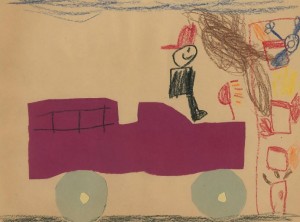Maybe you are familiar with the story of Cain and Abel?
It’s hard to think of a Bible story that has more potential triggers for retraumatization or difficult feelings for children from hard places and circumstances than this story of jealousy, murder, and judgment!
As the story goes, the first family is living out its existence after mom and dad (Eve and Adam) have been kicked out of the Garden of Eden. The family is small… just two sons at this point: Cain and Abel. Abel tends flocks while Cain works the soil.
When it comes time to thank God for the fruit of their labors, Cain gives some of his crop, while Abel provides a “first-fruit”: the best cuts of meat from the firstborn of his flock. God is pleased with Abel’s gift, but not Cain’s. Cain gets jealous, burns with anger toward his little brother, and eventually leads him out into the fields and kills him.
God addresses Cain and asks about Abel, to which Cain replies infamously: “How should I know? Am I my brother’s keeper?” Cain has not only murdered his brother, but now he’s trying to lie to God about it!
As a result, God “punishes” Cain by driving him away from his fields and family and he must make his way from now on by being a hunter and gatherer.
Not the most “trauma sensitive” story to tell to children 6-13 who have experienced their fair share of difficulty in their lives… or so I thought at first. But, putting this story through the lens of “trauma-informed ministry,” I believe I unearthed a truth that deepened my faith and allowed the children and staff to connect to God and this story in a new way. I’ll explain in just a bit. First, a word about retraumatization.
Retraumatization happens when a person is “triggered” by something or someone in their environment that takes them back to a previous experience of trauma. It is not merely reminding them of the trauma, they physically re-experience their trauma as if it were happening again–right at that moment. It happens as much to children and youth who have experienced adversity in childhood (ACEs) as it does to combat veterans. It’s not an uncommon experience among the clientele that Intermountain works with. So… why this talk of retraumatization?
Well, it’s my conviction that God is “trauma-informed,” and what I had seen for over four decades as God’s punishment of Cain was actually an act of mercy! Here’s how I explained it to the children in chapel…
I asked all those who had ever done something really bad or had something really bad happen to them in a certain place to raise their hand if it was hard for them to return to that place because it made them relive the experience in their minds and hearts?
EVERY HAND WENT UP… even those of our staff.
Then, I asked the children to put themselves in Cain’s position. He’s done something that
he is ashamed of. It’s so bad, he thinks he can hide it from God… hide it from himself. But, day after day he’d try and carry on working the field and doing what he knows how to do–plant and grow crops. All the while, he is working the same ground he buried his brother in! God points this out and shows Cain what he is doing is going to keep retraumatizing him: “You brother’s blood cries out from the ground!” Can you imagine a worse punishment than being forced to stay in that place for the rest of his life? Can you imagine God “rubbing his nose” in it by making Cain continue his life as a farmer?
So, what I saw (and had been taught to see!) as punishment was God’s grace… God forced Cain to leave what was familiar to lead a new life. He had to leave the fields in which he buried his brother and learn new skills and a new way of life.
It bears repeating, because it is at odds with our nature and how we often view God… God wasn’t punishing him, but instead giving Cain a chance to redefine himself as something other than a farmer who had murdered his brother!
Horrible things happen every day. Bad things happen to us and we have, perhaps, done our fair share of bad things. God’s grace means we don’t have to stay stuck there. We should stop retraumatizing ourselves by reliving our worst moments. None of us deserves to be known as the worst version of ourselves, and that is CERTAINLY not what God sees when he looks at us. God sees a son or daughter he desperately loves.
It was a message I needed to hear as much as our children. Perhaps you needed to hear it, too?



 Click here to subscribe to our RSS feed with your favorite email client and be alerted to new articles.
Click here to subscribe to our RSS feed with your favorite email client and be alerted to new articles.